English CBSE Class 10 NCERT First Flight Chapter 10 The Sermon at Benares Free Solution of Extra Questions and Answers – Extract Based Questions Short Answer Questions Long Answer Questions and Value Based Questions
THE SERMON AT BENARAS
(Extra Questions)
Extract Based Questions
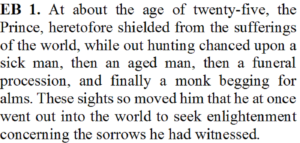

1. What was the name of the Prince?
2. Which word in the extract mean ‘protected’?
3. What sorrows had the prince witnessed?
4. Why did he go out into the world?
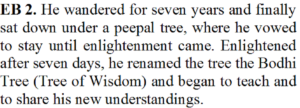

1. What was name of the peepal tree under which ‘he’ had meditated?
2. For how many days did ‘he’ meditate under a tree?
3. Which word in the extract is antonym of ‘ignorance’?
4. What was ‘he’ called after getting enlightened?
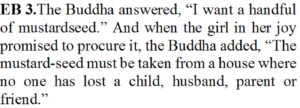

1. What is the name of the girl referred to in above extract?
2. What did Buddha ask the girl to bring?
3. What was the condition attached to procuring mustardseeds?
4. What is the plural of word ‘child’?
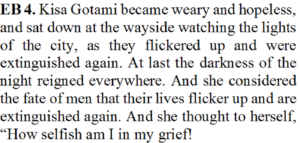

1. What understanding had ‘she’ developed?
2. Why Kisa had become hopeless?
3. Which word in the extract is synonym of ‘spread’?
4. What does flickering up and extinguishing of light represent?


1. Why was Kisa Gotami in grief?
2. What did she ask Buddha?
3. Which word in the extract is synonym of ‘went’?
4. Did Buddha cure the boy?
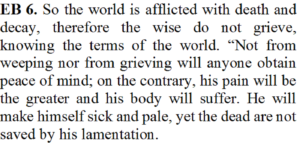

1. Why do wise people not grieve?
2. How does lamentation harm a person?
3. Which word in the extract mean ‘affected’?
4. Who is speaker of this extract?
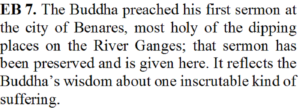

1. Where did Buddha preach his first sermon?
2. What did the sermon reflect?
3. Which the most holy place for dipping on river Ganges?
4. Which word in the extract mean ‘a religious speech’?
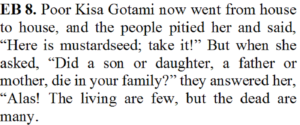

1. Why did Kisa went from house to house?
2. Who had advised Kisa to collect mustardseeds?
3. Why Kisa could not procure any musardseeds?
4. Which word in the extract is antonym of ‘questioned’?
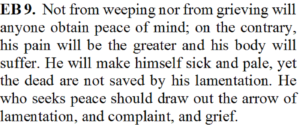

1. Who is speaker of above extract?
2. What will be the result of weeping and grieving?
3. What should be done to seek peace?
4. Which word in the extract is opposite of ‘strong’?
Short Answer Questions (30-40 words)


Answer: Kisa compares life with a light that flickers up and extinguishes. Flickering of light symbolizes beginning of life and extinguishing of light is symbolic of death. The darkness after extinguishing of light is symbolic of sadness after death.


Answer: At the age of twenty five prince saw a sick man, an old man, a funeral procession and a beggar. He left his palace and wandered in search of enlightenment. Finally he sat under a peepal tree for seven days and attained enlightenment. He was then called Gautama Buddha.


Answer: Buddha said that everyone who is born in this world would die someday. People who understand this term of the world do not grieve at the death. Such people are referred as wise by Buddha.


Answer: Prince Siddhartha meditated under a peepal tree to attain enlightenment. After that he was called Buddha which means who has attained enlightenment or who is awakened and is wise.


Answer: At the age of twenty five Prince Siddhartha saw a sick man, an old man, a funeral procession and a monk begging for alms. These sights moved him so much that he left his palace in search of enlightenment.


Answer: Buddha preached that everybody who is born will die someday. No amount of weeping or becoming sad will bring back the dead person. It will make our body sick and weak. The best way to get rid of sorrow is to become free of sadness.


Answer: He was born in royal family of northern India. His name was prince Siddhartha. At 12 he went to schooling to learn Hindu scriptures. He got married to a princes and they had a son. Till 25 he remained shielded from sufferings of the world.


Answer: Buddha said that life of mortals in this world is troubled, brief and full of pain. Everyone who is born needs to die. As ripe fruits are in danger of falling early, mortals when born are in the danger of death. Everyone is subjected to death.


Answer: Kisa could not find any house where death had not occurred. Weary and hopeless, she sat down at way side. She looked at lights that flickered up, extinguished and then a darkness spread everywhere. She then realised that life and death is a process of immortal world. Buddha explained it further to her.
Long Answer questions (120-150 words)


Answer: The young son of Kisa had died. She went from house to house requesting to give medicine to her child. A man advised her to go to Buddha.
Buddha advised her to procure a handful of mustardseeds from a house where death of a relative, friend or a child had not occurred. Kisa again went from house to house but she could not find such a house.
She became weary and hopeless. Now she realised that death is common to all. She had been very selfish of herself in her grief.
Gautama Buddha told her that life of mortals in this world is troubled, brief and full of pains. Everybody who is born in this world needs to die someday. As a ripe fruit is in the danger of falling early, so mortals when born are in the danger of death.
Now Kisa had finally learnt lesson of life.
****
FOR ANNE GREGORY
(Extra Questions)
Extract Based Questions
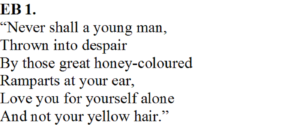

1. What does rampart mean?
2. Who is referred to as ‘you’ in the above extract?
3. Which word in the extract mean ‘hopelessness’.
4. Which poetic device has been used in fifth line of the extract?
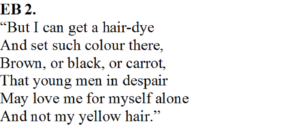

1. Why does the speaker say that she can change colour of hair?
2.Which word in the extract mean ‘colour’?
3. Which poetic device is used in second line of the extract?
4.What does colour of hair signify?
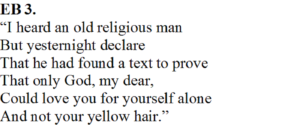

1. Who can love you for you alone?
2. Which poetic device has been used in fifth line of the extract?
3. Which word in the extract is antonym of ‘conceal’?
4.From where has the religious man quoted his thoughts?
Short Answer Questions (30-40 words)


Answer: People in this world admire others because of their external looks and beauty. Real beauty lies in character and inner strength. Though everybody is aware of this fact it is only God who loves a person based on his/ her character.
This is the central theme of the poem.


Answer: The old religious man told that he had found a text. This text proves that only the God loves us on the basis of ourselves alone. He does not consider external beauty.


Answer: God loves everybody on the basis of his / her character and values one has. On the contrary, a young person is attracted by physical appearances only.


Answer: Anne does not give any importance to external beauty. She is even ready to change colour of her beautiful hair. She wants that a person should love her for herself alone.
Long Answer questions (120-150 words)


Answer: The girl in the poem has long honey coloured beautiful hair. These come up to her ear and face. The author calls it rampart of yellow hair. A young man is attracted towards her because of beautiful hair.
However the girl expects that people should love her for herself alone. Her feelings are so strong that she is ready to change colour of her hair.
The poet manifests that it only the God who can love us by ourselves alone. The girl appears to be disappointed to know this fact.
In our daily life we pay attention to people because of their physical appearance, the wealth they possess and the power they wield. The society, many times, disregards the moral values and strength of character. This is one of the causes of increase in wrong doings in the society.
We must give more weightage to moral values. Such a shift will result into overall development of society.
****


0 Comments